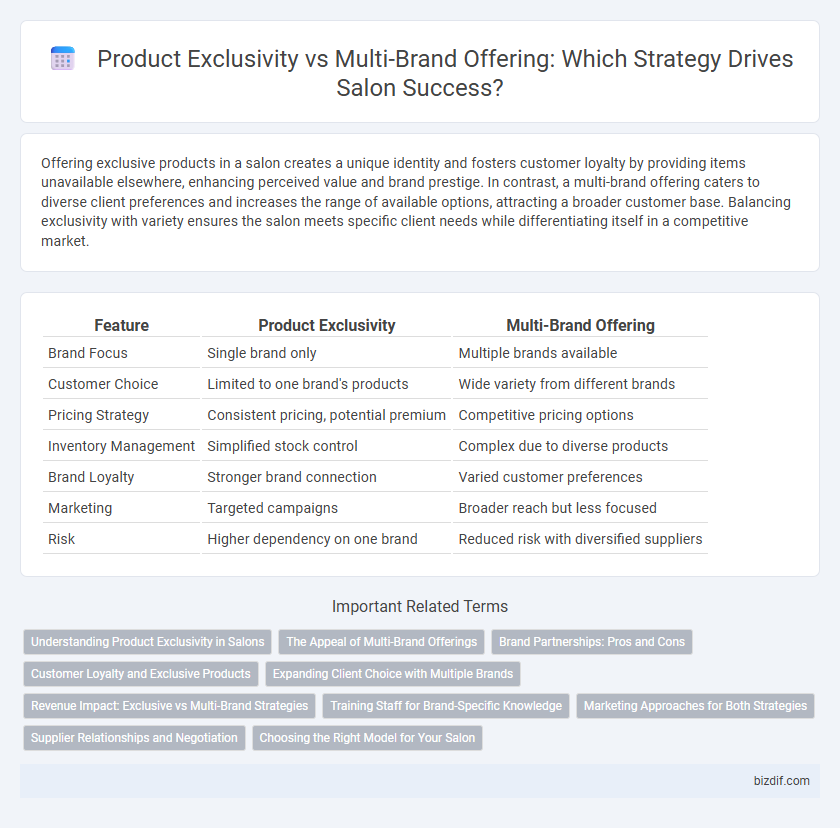Offering exclusive products in a salon creates a unique identity and fosters customer loyalty by providing items unavailable elsewhere, enhancing perceived value and brand prestige. In contrast, a multi-brand offering caters to diverse client preferences and increases the range of available options, attracting a broader customer base. Balancing exclusivity with variety ensures the salon meets specific client needs while differentiating itself in a competitive market.
Table of Comparison
| Feature | Product Exclusivity | Multi-Brand Offering |
|---|---|---|
| Brand Focus | Single brand only | Multiple brands available |
| Customer Choice | Limited to one brand's products | Wide variety from different brands |
| Pricing Strategy | Consistent pricing, potential premium | Competitive pricing options |
| Inventory Management | Simplified stock control | Complex due to diverse products |
| Brand Loyalty | Stronger brand connection | Varied customer preferences |
| Marketing | Targeted campaigns | Broader reach but less focused |
| Risk | Higher dependency on one brand | Reduced risk with diversified suppliers |
Understanding Product Exclusivity in Salons
Product exclusivity in salons enhances brand identity by offering unique, high-demand treatments and products unavailable elsewhere, driving customer loyalty and premium pricing opportunities. Exclusive partnerships with luxury or niche brands enable salons to differentiate themselves in a competitive market, appealing to discerning clients seeking specialized care. This strategic focus on singular brand offerings contrasts with multi-brand salons, which prioritize variety but may dilute perceived expertise and brand prestige.
The Appeal of Multi-Brand Offerings
Multi-brand offerings in salons attract diverse client preferences by showcasing a wide range of hair care and beauty products from various trusted brands. This approach enhances customer satisfaction and loyalty by providing personalized solutions tailored to different hair types and styles. Expanding product variety also boosts sales potential through cross-selling opportunities and keeps the salon competitive in a dynamic beauty market.
Brand Partnerships: Pros and Cons
Brand partnerships with exclusive product lines can elevate a salon's prestige, foster customer loyalty, and enable tailored marketing strategies that align with the salon's identity. Offering multi-brand selections increases variety, attracts diverse clientele, and reduces dependency on a single supplier, mitigating risks such as supply chain disruptions. However, exclusivity limits flexibility and inventory diversity, while multi-brand offerings may dilute brand identity and complicate staff training on multiple product philosophies.
Customer Loyalty and Exclusive Products
Exclusive products in salons foster stronger customer loyalty by offering unique treatments and premium brands unavailable elsewhere, enhancing perceived value and client trust. Multi-brand offerings provide variety but may dilute brand identity and reduce the emotional connection between clients and the salon. Prioritizing product exclusivity can differentiate the salon in a competitive market, encouraging repeat visits and long-term customer retention.
Expanding Client Choice with Multiple Brands
Offering multiple brands in a salon expands client choice by catering to diverse hair types, preferences, and budgets, enhancing overall satisfaction. A multi-brand approach allows salons to stock exclusive products alongside popular lines, meeting varied customer needs and boosting repeat visits. This strategy improves competitive advantage by attracting a broader clientele seeking personalized hair care solutions.
Revenue Impact: Exclusive vs Multi-Brand Strategies
Exclusive product offerings in salons often lead to higher profit margins due to brand loyalty and perceived value, driving consistent revenue growth. Multi-brand strategies enhance customer choice and attract a wider demographic, potentially increasing overall sales volume but with slimmer margins per product. Balancing exclusivity with a curated selection of complementary brands can optimize revenue by leveraging both premium pricing and diverse customer appeal.
Training Staff for Brand-Specific Knowledge
Training staff in brand-specific knowledge enhances product exclusivity by ensuring personalized service and in-depth expertise, which builds client trust and loyalty. Exclusive brands often require specialized techniques and product understanding that only comprehensive training can provide, differentiating the salon's offer from multi-brand competitors. Investing in targeted education equips stylists to maximize product performance and deliver tailored recommendations, driving higher sales and customer satisfaction.
Marketing Approaches for Both Strategies
Product exclusivity in salons leverages unique, high-end brands to create premium appeal and enhance customer loyalty through brand distinction and limited availability. Multi-brand offerings expand consumer choice, attract diverse client segments, and increase sales opportunities by showcasing a broad range of products tailored to varied hair and beauty needs. Marketing exclusive products often involves targeted storytelling and luxury positioning, while multi-brand strategies emphasize value, variety, and personalized consultations to drive engagement and conversion.
Supplier Relationships and Negotiation
Product exclusivity in salons strengthens supplier relationships by fostering loyalty and securing favorable pricing through long-term commitments with select brands. Multi-brand offerings require salons to negotiate with multiple suppliers, balancing diverse product portfolios and competitive terms to meet varied client preferences. Strategic negotiation skills enhance the ability to obtain volume discounts, promotional support, and flexible payment terms regardless of exclusivity or variety.
Choosing the Right Model for Your Salon
Selecting the right product model for your salon hinges on balancing product exclusivity with a multi-brand offering to align with your target clientele and brand identity. Exclusive product lines can elevate your salon's prestige and create loyal customer demand, while a diverse multi-brand selection appeals to a broader audience with varied preferences and budget ranges. Analyzing customer demographics, service types, and competitive landscape helps determine whether a single premium brand or multiple product options better optimize sales and client satisfaction.
Product Exclusivity vs Multi-Brand Offering Infographic

 bizdif.com
bizdif.com